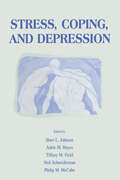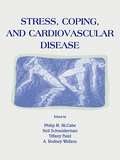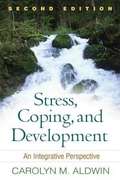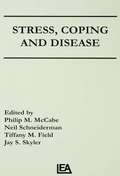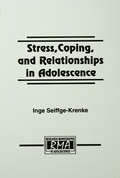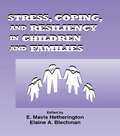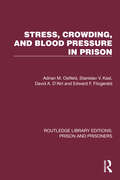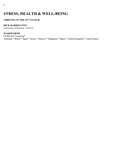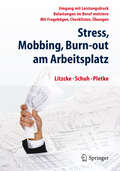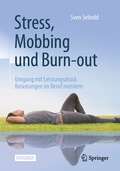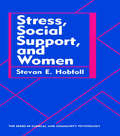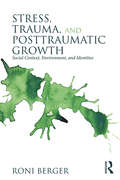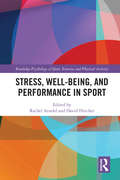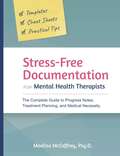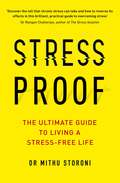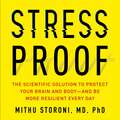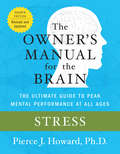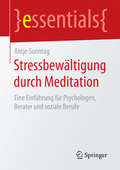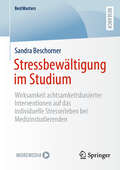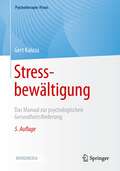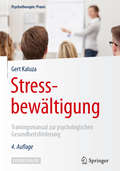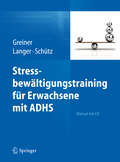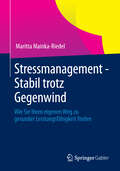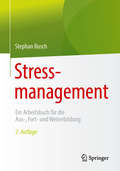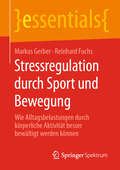- Table View
- List View
Stress, Coping and Depression (Stress and Coping Series)
by Neil Schneiderman Sheri L. Johnson Adele M. Hayes Tiffany M. Field Philip MccabeStress, Coping, and Depression is the latest volume based on the Annual Stress and Coping Conference held at the University of Miami. In this timely collection, leading researchers offer a variety of new perspectives on depression. They review the social, biological, and psychological processes that put adults and their children at risk and discuss innovative treatments grounded in empirical studies. Research findings are integrated across domains to construct more effective models of etiology and intervention. The contributors' thought-provoking ideas will provide inspiration for the ongoing efforts addressing the problems associated with this devastating disorder. Content highlights include: * novel information processing approaches to depression; * an overview of the neural pathways guiding moods; * empirical approaches for the treatment of bipolar disorders; * integrated models of biological and environmental influences on the transmission of depression to children; and * new perspectives on the relationship between personality and stress.
Stress, Coping, and Cardiovascular Disease (Stress and Coping Series)
by Neil Schneiderman Philip M. McCabe Tiffany Field A. Rodney WellensThe latest volume in the series based on the Annual Stress and Coping Symposia held at the University of Miami, Drs. McCabe, Schneiderman, Field, and Wellens bring together an outstanding group of researchers to examine the relationship between bio-behavioral and social factors and heart disease. Highlights of the book include an in-depth look at the latest research on: * basic physiological processes in cardiovascular reactivity to stress; * pathophysiological mechanisms in cardiovascular disease; * ethnic differences in cardiovascular regulation; * psychosocial influences on cardiovascular function/disease; and * Behavioral interventions designed to treat cardiovascular disorders. The goal of Stress, Coping, and Cardiovascular Disease is to provide a solid empirical foundation on the relationship between stress and cardiovascular disease so as to stimulate further research into the pathophysiology and treatment of the leading cause of death in industrialized countries.
Stress, Coping, and Development, Second Edition
by Carolyn AldwinHow do people cope with stressful experiences? What makes a coping strategy effective for a particular individual? This volume comprehensively examines the nature of psychosocial stress and the implications of different coping strategies for adaptation and health across the lifespan. Carolyn M. Aldwin synthesizes a vast body of knowledge within a conceptual framework that emphasizes the transactions between mind and body and between persons and environments. She analyzes different kinds of stressors and their psychological and physiological effects, both negative and positive. Ways in which coping is influenced by personality, relationships, situational factors, and culture are explored. The book also provides a methodological primer for stress and coping research, critically reviewing available measures and data analysis techniques. New to This Edition Incorporates advances in concepts, tools, and data. Chapters addressing physiology and physical health. Expanded coverage of sociocultural and religious aspects of coping, and of childhood, young adulthood, and mid-life. New perspectives on emotion regulation and stress-related growth.
Stress, Coping, and Disease (Stress and Coping Series)
by Jay S. Skyler Neil Schneiderman Tiffany M. Field Philip M. McCabeThe third volume based on the annual University of Miami Symposia on Stress and Coping, this book focuses on the role of biophysical factors in four of the greatest health problems confronting us today: cardiovascular disease, diabetes, cancer, and the AIDS epidemic. In each of these disorders, stress is seen as a contributing factor that interacts with other variables such as genetic influences or constitutional factors. Accordingly, the behavioral treatments discussed are often designed to change lifestyles, reduce stress, or improve adherence to therapeutic regimens. This volume provides a solid theoretical base which should stimulate further research into biobehavioral mechanisms and treatments for the disorders it examines.
Stress, Coping, and Relationships in Adolescence (Research Monographs in Adolescence Series)
by Inge Seiffge-KrenkeUnique and comprehensive, this volume integrates the most updated theory and research relating to adolescent coping and its determinants. This book is the result of the author's long interest in, and study of, stress, coping, and relationships in adolescence. It begins with an overview of research conducted during the past three decades and contrasts research trends in adolescent coping in the United States and Europe over time. Grounded on a developmental model for adolescent coping, the conceptual issues and major questions are outlined. Supporting research ties together the types of stressors, the ways of coping with normative and non-normative stressors, and the function that close relationships fulfill in this context.More than 3,000 adolescents from different countries participated in seven studies that are built programmatically on one another and focus on properties that make events stressful, on coping processes and coping styles, on internal and social resources, and on stress-buffering and adaptation. A variety of assessment procedures for measuring stress and coping are presented, including semi-structured interviews, questionnaires, and content analysis. This multimethod-multivariate approach is characterized by assessing the same construct via different methods, replicating the measures in different studies including cross-cultural samples, using several informants, and combining standardized instruments with very open data gathering.The results offer a rich picture of the nature of stressors requiring adolescent coping and highlight the importance of relationship stressors. Age and gender differences in stress appraisal and coping style are also presented. Mid-adolescence emerges as a turning point in the use of certain coping strategies and social resources. Strong gender differences in stress appraisal and coping style suggest that females are more at risk for developing psychopathology. The book demonstrates how adolescents make use of assistance provided by social support systems and points to the changing influence of parents and peers. It addresses controversial issues such as benefits and costs of close relationships or the beneficial or maladaptive effects of avoidant coping. Its clear style, innovative ideas, and instruments make it an excellent textbook for both introductory and advanced courses. Without question, it may serve as a guide for future research in this field.This book will be of value to researchers, practitioners, and students in various fields such as child clinical and developmental psychology and psychopathology.
Stress, Coping, and Resiliency in Children and Families (Advances in Family Research Series)
by E. Mavis Hetherington Elaine A. BlechmanConcern with stress and coping has a long history in biomedical, psychological and sociological research. The inadequacy of simplistic models linking stressful life events and adverse physical and psychological outcomes was pointed out in the early 1980s in a series of seminal papers and books. The issues and theoretical models discussed in this work shaped much of the subsequent research on this topic and are reflected in the papers in this volume. The shift has been away from identifying associations between risks and outcomes to a focus on factors and processes that contribute to diversity in response to risks. Based on the Family Research Consortium's fifth summer institute, this volume focuses on stress and adaptability in families and family members. The papers explore not only how a variety of stresses influence family functioning but also how family process moderates and mediates the contribution of individual and environmental risk and protective factors to personal adjustment. They reveal the complexity of current theoretical models, research strategies and analytic approaches to the study of risk, resiliency and vulnerability along with the central role risk, family process and adaptability play in both normal development and childhood psychopathology.
Stress, Crowding, and Blood Pressure in Prison (Routledge Library Editions: Prison and Prisoners)
by Adrian M. Ostfeld Stanislav V. Kasl David A. D'Atri Edward F. FitzgeraldOriginally published in 1987, the purpose of Stress, Crowding, and Blood Pressure in Prison was to present, in a single location, the rationale, background, methods, principal results, analyses, interpretations, and conclusions of the authors’ studies at Massachusetts correctional institutions. Employing a longitudinal method for studying 568 inmates, the authors drew on psychological, social and health sciences assessments to identify the effects of housing mode, prison employment, leisure activities, disciplinary actions, and personal and sociodemographic characteristics to identify what was particularly stressful for inmates. A parallel study of prison staff and a specific series of conclusions and recommendations concludes the book.
Stress, Health and Well-Being: Thriving in the 21st Century
by Rick HarringtonDiscover the science that underlies one of the most pervasive forces in modern life with STRESS, HEALTH, AND WELL-BEING: THRIVING IN THE 21st CENTURY. With research findings and coping strategies integrated throughout, this text is a useful tool for helping you understand and approach stress effectively.
Stress, Mobbing und Burn-out am Arbeitsplatz
by Sven Litzcke Horst Schuh Matthias PletkeStress gilt als eine der größten Gesundheitsgefahren - häufig ist die Ursache der Dauerstress, den Leistungs- und Zeitdruck am Arbeitsplatz erzeugen. Dabei kann Stress positiv wirken, wenn die Bedingungen stimmen. Die Autoren zeigen, wie sich ein Weg zwischen negativem Stress und positiven Herausforderungen finden lässt. Dazu liefern sie Grundlagenwissen zur Entstehung und zu den Folgen von Stress sowie praxisorientierte Methoden zur Stressbewältigung. Neu in der 6. Auflage: Material zu Mobbing und Burn-out sowie Hinweise zu rechtlichen Problemen.
Stress, Mobbing und Burn-out: Umgang mit Leistungsdruck — Belastungen im Beruf meistern
by Sven SeiboldStress gilt als eine der größten Gesundheitsgefahren – häufig ist die Ursache der Dauerstress, den Leistungs- und Zeitdruck am Arbeitsplatz erzeugen. Dabei kann Stress positiv wirken, wenn die Bedingungen stimmen. Die Autoren zeigen, wie sich ein Weg zwischen negativem Stress und positiven Herausforderungen finden lässt. Dazu liefern sie Grundlagenwissen zur Entstehung und zu den Folgen von Stress sowie praxisorientierte Methoden zur Stressbewältigung. Neu in der 6. Auflage: Material zu Mobbing und Burn-out sowie Hinweise zu rechtlichen Problemen.
Stress, Social Support, And Women (Clinical and Community Psychology)
by Stevan E. HobfollFirst published in 1986. This book is concerned with the stressors women undergo from adolescence to old age and the resources, especially interpersonal resources, women use to cope with these stressors. There follows a series of chapters that address the use of social support as a resource for coping with stressful life events that confront women in a variety of contexts during their life span.
Stress, Trauma, and Posttraumatic Growth: Social Context, Environment, and Identities
by Roni BergerWhat happens in the trauma’s aftermath? How do its effects manifest differently on the individual, family, and community-wide levels? Stress, Trauma, and Posttraumatic Growth: Social Context, Environment, and Identities explores the way traumatic events are defined, classified, and understood throughout the life cycle, placing special emphasis on the complex intersections of diverse affiliations and characteristics such as age, class, culture, disability, race and ethnicity, gender identity and expression, immigration status, political ideology, religion, sex, and sexual orientation. The book gives its readers a solid basis for understanding traumatic events and treating their effects and also shows the varied ways that trauma is conceptualized across cultures. Both new and seasoned clinicians will come away from Stress, Trauma, and Posttraumatic Growth with a deep understanding of the principles that guide successful trauma treatment.
Stress, Well-Being, and Performance in Sport (Routledge Psychology of Sport, Exercise and Physical Activity)
by David Fletcher Rachel ArnoldStress, Well-Being, and Performance in Sport provides the first comprehensive and contemporary overview of stress in sport and its implications on performance and well-being. It explores how athletes’, coaches, and support staff’s performance can be enhanced while simultaneously optimizing their well-being in contemporary sport. Divided into four sections following the stress process, Stress, Well-Being, and Performance in Sport covers key topics including: Appraising and coping with stress in sport Responses to and outcomes of stress in sport Moderators of the stress process in sport Stress management to promote thriving in sport Bringing together theory and practice, each chapter discusses conceptual and theoretical issues, current research, and innovative practical implications. Written by scholars around the globe, Stress, Well-being, and Performance offers an international perspective. It is important reading for students of sport psychology as well as coaches, athletes, and support staff.
Stress-Free Documentation for Mental Health Therapists: The Complete Guide to Progress Notes, Treatment Planning, and Medical Necessity
by Maelisa McCaffreyMental health therapists write progress notes every day of their career, yet many clinicians receive little or no training on this topic. They try to use vague ethical guidelines, legalese, and hearsay from office colleagues to determine the answer to an all-important question: What goes in a progress note? They do this knowing that documentation is the key to justifying medical necessity, which is necessary for counseling clients who use insurance, and often determines whether or not a therapist gets paid. In short, clinical documentation becomes a significant stressor for many mental health professionals. Stress Free Documentation for Mental Health Therapists provides quick and easy to use templates, practical advice for saving time on administrative tasks, and research-backed recommendations. Also included are starter phrases, cheat sheets, and all of the following: Guidance on using the book based on your setting and experience, including a quiz to determine you most pressing documentation needs. Ethical standards related to documentation, based on the various professional ethics codes, and legal considerations for creating policies and procedures. Medical necessity criteria and how to integrate this throughout all aspects a client file. Tips for better quality intake assessments that provide clear justification for a mental health diagnosis, combined with time-saving and administrative strategies. A succinct, yet thorough, breakdown of the potential components of a progress note, with direction on how to create a high-quality progress note template. The QUOTE Framework for determining how to catch up on progress notes, and more importantly, stay caught up throughout your mental health career. Formulas for creating easy-to-write, meaningful treatment goals with clients, and direction for creating your own high-quality treatment plan template. Considerations, founded in ethical principles and relevant laws, for coordinating care with other professionals, releasing mental health records, and discussing potential limits to confidentiality with clients. This book will not only show you what to write in your mental health paperwork, it will teach you how to think about documentation so you can make informed decisions on your own.
Stress-Proof: The ultimate guide to living a stress-free life
by Mithu StoroniAre you ready to stop feeling constantly stressed and become the best version of you?In Stress-Proof, Dr Mithu Storoni arms you with all the tools you need to improve your relationship with stress and, in turn, positively boost your mental and physical wellbeing. This book will help you to ensure that a brief stressful episode doesn't turn into systematic overload, leading to inflammation, anxiety, depression or other chronic health issues.Each chapter examines a common stress agent and presents simple ways to minimise its harmful effects with changes in diet, exercise and other daily habits. By strengthening your natural defences, you will guarantee that your mind remains sharp and your body resilient so you're ready for whatever life throws at you. Translating cutting-edge scientific research into applied lifestyle advice, Stress-Proof is the ultimate user's guide for a healthy mind and body.*Rated #14 on the '100 Best Stress Management Books of All Time' list by BookAuthority*'Discover the toll that chronic stress can take and how to reverse its effects in this brilliant, practical guide to overcoming stress' - Dr Rangan Chatterjee, Author of The Stress Solution'This new book could be the answer to a stress-free life ... emphatically not just another manual on mindful meditation, it's an insightful, science-based guide on how to mitigate the debilitating effects of stress.' - Evening Standard
Stress-Proof: The ultimate guide to living a stress-free life
by Mithu StoroniDISCOVER SIMPLE, SCIENCE-BASED STRATEGIES FOR BEATING STRESS AT ITS OWN GAME. When's the best time to exercise - and how much is too much? Which foods fortify the brain, and which do the opposite? How can we use music, movement and motivation to boost our rational brain and keep our cool no matter what life throws our way?This practical and ground-breaking guide reveals seven paths to fighting the effects of stress to strengthen our natural defences so that our minds remain sharp, and our bodies resilient, no matter the circumstances. Each chapter examines a common stress agent - including inflammation, an out-of-sync body clock, cortisol levels and emotional triggers, and presents simple ways to minimise its harmful effects, for example, by changing your diet, exercising and other simple habits.Translating cutting-edge scientific findings into clear and simple advice, Stress-Proof is the ultimate user's guide for body, mind and wellbeing.(P)2017 Penguin Audio
Stress: The Owner's Manual
by Pierce HowardCutting-edge, user-friendly, and comprehensive: the revolutionary guide to the brain, now fully revised and updatedAt birth each of us is given the most powerful and complex tool of all time: the human brain. And yet, as we well know, it doesn't come with an owner's manual--until now. In this unsurpassed resource, Dr. Pierce J. Howard and his team distill the very latest research and clearly explain the practical, real-world applications to our daily lives. Drawing from the frontiers of psychology, neurobiology, and cognitive science, yet organized and written for maximum usability, The Owner's Manual for the Brain, Fourth Edition, is your comprehensive guide to optimum mental performance and well-being. It should be on every thinking person's bookshelf. What are the ingredients of happiness? Which are the best remedies for headaches and migraines? How can we master creativity, focus, decision making, and willpower? What are the best brain foods? How is it possible to boost memory and intelligence? What is the secret to getting a good night's sleep? How can you positively manage depression, anxiety, addiction, and other disorders? What is the impact of nutrition, stress, and exercise on the brain? Is personality hard-wired or fluid? What are the best strategies when recovering from trauma and loss? How do moods and emotions interact? What is the ideal learning environment for children? How do love, humor, music, friendship, and nature contribute to well-being? Are there ways of reducing negative traits such as aggression, short-temperedness, or irritability? What is the recommended treatment for concussions? Can you delay or prevent Alzheimer's and dementia? What are the most important ingredients to a successful marriage and family? What do the world's most effective managers know about leadership, motivation, and persuasion? Plus 1,000s more topics!
Stressbewältigung durch Meditation: Eine Einführung für Psychologen, Berater und soziale Berufe (essentials)
by Antje SonntagIm vorliegenden essential gibt Antje Sonntag einen grundlegenden Einblick in die verschiedenen Formen und Möglichkeiten der Meditation sowie deren Wirkung auf Stressfaktoren. Meditation kann bei der Bewältigung von körperlichem und psychischem Stress sehr gute Dienste leisten: Bei regelmäßiger und richtiger Übungspraxis lernen Betroffene, Stressfaktoren zu erkennen und zu verstehen. Der eigene Umgang mit Stressoren ändert sich, so dass Stress reduziert und sogar vermieden werden kann. Die hier vorgestellten Ergebnisse aus der Meditationsforschung belegen zudem die zahlreichen positiven Wirkungen der Meditation. Praxistipps im Buch ergänzen, auf welche Weise Meditation im Alltag und in der Therapie eingesetzt werden kann.
Stressbewältigung im Studium: Wirksamkeit achtsamkeitsbasierter Interventionen auf das individuelle Stresserleben bei Medizinstudierenden (BestMasters)
by Sandra BeschornerStress und psychische Belastungen sind unter Studierenden weit verbreitet, insbesondere bei Medizinstudierenden, die aufgrund der hohen Anforderungen ihres Studiums eine erhöhte Prävalenz klinisch relevanter psychischer Störungen aufweisen. Fehlende adäquate Stressbewältigungsstrategien können langfristig zu negativen gesundheitlichen und beruflichen Konsequenzen führen. In diesem Zusammenhang gewinnen achtsamkeitsbasierte Interventionen zunehmend an Bedeutung, da sie als wirksame Methode zur Stressreduktion gelten. Im Zentrum dieses Buches steht die Untersuchung der Wirksamkeit achtsamkeitsbasierter Interventionen auf das individuelle Stresserleben von Medizinstudierenden. Besonderes Interesse gilt der Frage, inwiefern bestimmte Interventions-Rahmenbedingungen die Wirksamkeit sowie die Teilnahmebereitschaft beeinflussen.
Stressbewältigung: Das Manual zur psychologischen Gesundheitsförderung (Psychotherapie: Praxis)
by Gert KaluzaMit diesem Manual werden Sie fit für die Durchführung des psychologischen Gesundheitsförderungsprogramms: Gelassen und sicher im Stress. Es wird seit über 25 Jahren erfolgreich eingesetzt und von den gesetzlichen Krankenkassen als geprüfte Präventionsmaßnahme gefördert. In Teil I finden Sie Hintergrundwissen aus der Stressforschung: kompakt, fundiert und verständlich. Teil II enthält die Trainingsbausteine: (1) Entspannungstraining: entspannen und loslassen. (2) Mentaltraining: förderliche Denkweisen und Einstellungen entwickeln. (3) Problemlösetraining: Stresssituationen wahrnehmen, annehmen und verändern. (4) Genusstraining: erholen und genießen. (5) Ergänzungsmodule zu Stressbewältigung durch Sport und Bewegung, Pflege des sozialen Netzes, Zielklärung, gesunden Umgang mit der Zeit und der 4xA-Strategie für den Akutfall. Aus dem Inhalt: Didaktische Hinweise für eine kompetente Durchführung des Trainings – abwechslungsreiche Gestaltung durch viele praktisch erprobte Übungen – Teilnehmerunterlagen, die informieren und motivieren – alle Trainingsmaterialien stehen zum Ausdrucken online zur Verfügung. Der Autor: Prof. Dr. Gert Kaluza ist psychologischer Psychotherapeut und als Trainer, Coach und Autor im Bereich der individuellen und betrieblichen Gesundheitsförderung tätig. Nach 20jähriger Tätigkeit an Universitäten gründete er 2002 sein eigenes Fortbildungs- und Trainingsinstitut, das GKM-Institut für Gesundheitspsychologie, das er bis 2022 selbst leitete.
Stressbewältigung: Trainingsmanual zur psychologischen Gesundheitsförderung (Psychotherapie: Praxis)
by Gert KaluzaMit diesem Kursleiter-Manual werden Sie fit für die Durchführung des psychologischen Gesundheitsförderungsprogramms "Gelassen und sicher im Stress". Es wird seit über 20 Jahren erfolgreich eingesetzt und von den gesetzlichen Krankenkassen als geprüfte Präventionsmaßnahme gefördert. In Teil I finden Sie Hintergrundwissen aus der Stressforschung: kompakt, fundiert und verständlich. Teil II enthält Trainingsbausteine in 4 Trainings- und 5 Ergänzungsmodulen: (1) Entspannungstraining: entspannen und loslassen. (2) Mentaltraining: förderliche Denkweisen und Einstellungen entwickeln. (3) Problemlösetraining: Stresssituationen wahrnehmen, annehmen und verändern. (4) Genusstraining: erholen und genießen. (5) Ergänzungsmodule zu Stressbewältigung durch Sport und Bewegung, Pflege des sozialen Netzes, Zielklärung, gesunden Umgang mit der Zeit und der 4xA-Strategie für den Akutfall.Aus dem Inhalt: Didaktische Hinweise für eine kompetente Durchführung des Trainings – abwechslungsreiche Gestaltung durch viele Übungen – Teilnehmerunterlagen, die informieren und motivieren – alle Trainingsmaterialien im Buch stehen zum Ausdrucken für Teilnehmer online zur Verfügung.Der Autor: Prof. Dr. Gert Kaluza ist psychologischer Psychotherapeut und als Trainer, Coach und Autor im Bereich der individuellen und betrieblichen Gesundheitsförderung tätig. Nach über 20jähriger Tätigkeit an Universitäten gründete er 2002 sein eigenes Fortbildungs- und Trainingsinstitut, das GKM-Institut für Gesundheitspsychologie.
Stressbewältigungstraining für Erwachsene mit ADHS
by Astrid Schütz Sylvia Langer Anja GreinerADHS bei Erwachsenen zeigt zwar andere Ausprägungen als bei Kindern, die Beeinträchtigungen für Betroffene können aber ebenso einengend sein. Sie leiden häufig unter Stresssymptomen und den Folgen anderer Belastungen. Für die Therapie haben die Autorinnen ein modular aufgebautes Programm entwickelt, das unmittelbar eingesetzt werden kann. Neben den theoretischen Grundlagen zu ADHS und Stressentstehung liefert der Band einen ausführlichen Trainingsleitfaden für die Therapiesitzung. Mit Arbeitsblättern und weiteren Materialien auf DVD und im Internet.
Stressmanagement - Stabil trotz Gegenwind: Wie Sie Ihren eigenen Weg zu gesunder Leistungsfähigkeit finden
by Maritta Mainka-RiedelInformationsflut, Konkurrenzkampf, Druck ausübende Chefs sowie immer knappere Deadlines: Im heutigen Arbeitsalltag gehören diese Zustände zur Tagesordnung. Die Anzahl der stressbedingten seelischen und körperlichen Krankheits-Symptome nimmt stetig zu. Das Burnout-Syndrom ist in aller Munde. Zu beneiden sind diejenigen, die es schaffen, Stress an sich abprallen zu lassen, körperlich und seelisch stabil und letztlich gesund zu bleiben. Die erfahrene Anti-Stress-Trainerin Maritta Mainka-Riedel zeigt in diesem Buch u. a. neueste Ansätze aus Neurobiologie und Resilienzforschung auf. Sie bietet im Betriebsalltag erprobte Lösungsstrategien - nicht nur für bereits von Stresssymptomen Betroffene, sondern auch für alle, die sich langfristig vor den Folgen von Stress schützen möchten. Anhand von authentischen Beispielen beschreibt sie Tipps und Techniken aus der persönlichen Begleitung von Berufstätigen, die sich mehrfach und nachhaltig in der Praxis bewährt haben. Dieses Buch hilft Ihnen dabei, im Gegenwind des turbulenten Arbeitsalltags Ihre persönlichen Stressoren zu erkennen und Stabilität zu entwickeln. Erlernen Sie eine neue Gelassenheit im Umgang mit den Herausforderungen, die Ihnen tagtäglich im Arbeitsleben begegnen. Befreien Sie sich aus scheinbar ausweglosen Situationen und steuern Sie Ihr Leben wieder selbst. Erstellen Sie Ihre eigene Anti-Stress-Strategie und stärken Sie so Ihr Selbstvertrauen. Entdecken Sie neue Handlungsspielräume und gewinnen Sie mehr Lebensfreude, Erfolg und Zufriedenheit.
Stressmanagement: Ein Arbeitsbuch für die Aus-, Fort- und Weiterbildung
by Stephan RuschDieses Theorie- und Praxismanual gibt einen grundlegenden und wissenschaftlich fundierten Überblick über alle Themen des Stressmanagements: Von theoretischen Grundlagen zu Stress und Stressreaktionen über Methoden zur Analyse und Stressbewältigung bis hin zu praktischen Anregungen für die Durchführung eigener Stressmanagementseminare.Mit zahlreichen Arbeitsmaterialien und Fragen zur Überprüfung des eigenen Wissensstandes.
Stressregulation durch Sport und Bewegung: Wie Alltagsbelastungen durch körperliche Aktivität besser bewältigt werden können (essentials)
by Reinhard Fuchs Markus GerberDie Frage, wie Bewegung und Sport dazu beitragen können, mit Stress und Belastungen im Alltag gesundheitsschonend umzugehen, hat für viele Menschen hohe subjektive Relevanz. In diesem essential stellen Markus Gerber und Reinhard Fuchs die gesundheitsrelevanten Aspekte von Bewegung und Sport in kompakter Form dar. Die Autoren geben einen Überblick darüber, was zu diesem Thema bereits bekannt ist, welche Erwartungen an den Sport realistischerweise geknüpft werden dürfen und woran im Speziellen gedacht werden sollte, wenn man Bewegung und Sport als Mittel zur Stressbewältigung vermitteln bzw. nutzen möchte.
